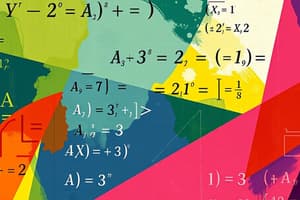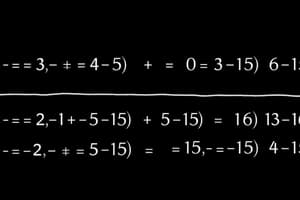Podcast
Questions and Answers
What is the primary focus of algebra?
What is the primary focus of algebra?
- Calculating the area and perimeter of figures
- Using symbols to represent numbers and relationships between variables (correct)
- Analyzing data sets using graphs and charts
- Understanding geometric shapes and their properties
What do constants in algebra represent?
What do constants in algebra represent?
- Expressions that include multiple operations
- Unknown quantities that need solving
- Fixed values that do not change (correct)
- Variables that can change
Which of the following best describes an equation?
Which of the following best describes an equation?
- A statement that indicates an inequality between two quantities
- A statement showing the relation between variables without equality
- A representation of a single operation
- A statement that shows the equality of two expressions (correct)
What symbol is typically used in inequalities?
What symbol is typically used in inequalities?
In algebra, what are variables used for?
In algebra, what are variables used for?
Flashcards
Algebra
Algebra
A branch of math using symbols to represent numbers and quantities.
Variable
Variable
A symbol representing an unknown quantity.
Constant
Constant
A fixed value in a mathematical expression.
Equation
Equation
Signup and view all the flashcards
Inequality
Inequality
Signup and view all the flashcards
Study Notes
Fundamental Concepts
- Algebra is a branch of mathematics that uses symbols to represent numbers and quantities.
- It deals with relationships between variables and the operations performed on them.
- Variables are symbols that represent unknown quantities.
- Constants are fixed values.
- Equations are statements that show the equality of two expressions.
- Inequalities are statements that show the relationship between two expressions using symbols like >, <, ≥, or ≤.
- Expressions are combinations of numbers, variables, and operators.
- Exponents represent repeated multiplication.
- Polynomials are expressions involving variables and constants.
Basic Operations
- Addition: Combining quantities.
- Subtraction: Finding the difference between two quantities.
- Multiplication: Repeated addition of a quantity.
- Division: Finding how many times one quantity is contained within another.
- Order of operations (PEMDAS/BODMAS): Parentheses or Brackets, Exponents or Orders, Multiplication and Division (from left to right), Addition and Subtraction (from left to right). Following this order is crucial for obtaining correct results.
Linear Equations
- A linear equation has the form ax + b = 0, where 'a' and 'b' are constants and 'x' is a variable.
- It represents a straight line on a graph.
- Solving linear equations involves isolating the variable using inverse operations.
- The solution is the value of the variable that makes the equation true.
Quadratic Equations
- A quadratic equation has the form ax² + bx + c = 0, where a, b, and c are constants and a ≠ 0.
- It represents a parabola on a graph.
- Quadratic equations can be solved using factoring, completing the square, or the quadratic formula.
- The quadratic formula is a general formula that gives the solutions to any quadratic equation.
Polynomials
- Polynomials are expressions composed of variables and coefficients, along with arithmetic operations.
- The degree of a polynomial is the highest power of the variable.
- Polynomials can be added, subtracted, multiplied, and divided.
- Factoring polynomials involves expressing them as a product of simpler factors.
Systems of Equations
- A system of equations involves multiple equations with multiple variables.
- Methods for solving systems of equations include substitution, elimination, and graphing.
- Solutions to a system of equations are values that satisfy all the equations in the system.
Exponents and Radicals
- Exponents represent repeated multiplication and involve bases and exponents.
- Rules for exponents govern how exponents behave when combined.
- Radicals are used to represent roots of numbers.
- Rules for radicals govern their behavior during operations.
Functions
- Functions describe relationships between input values (often x) and output values (often y).
- A function is defined as a relationship where each input value corresponds to exactly one output value.
- The input values make up the domain, and the output values make up the range.
- Graphing functions visualizes the relationship between input and output values.
Inequalities
- Inequalities describe relationships between expressions that aren't equal.
- Inequality signs include <, >, ≤, ≥.
- Solving inequalities uses similar methods to solving equations but requires adjusting the direction of the inequality sign under certain conditions.
Word Problems
- Algebra is used to model and solve real-world problems.
- Identifying the unknowns and writing equations or inequalities based on the problem statement is crucial.
- Solving the equations and inequalities leads to the solution to the problem.
Studying That Suits You
Use AI to generate personalized quizzes and flashcards to suit your learning preferences.




